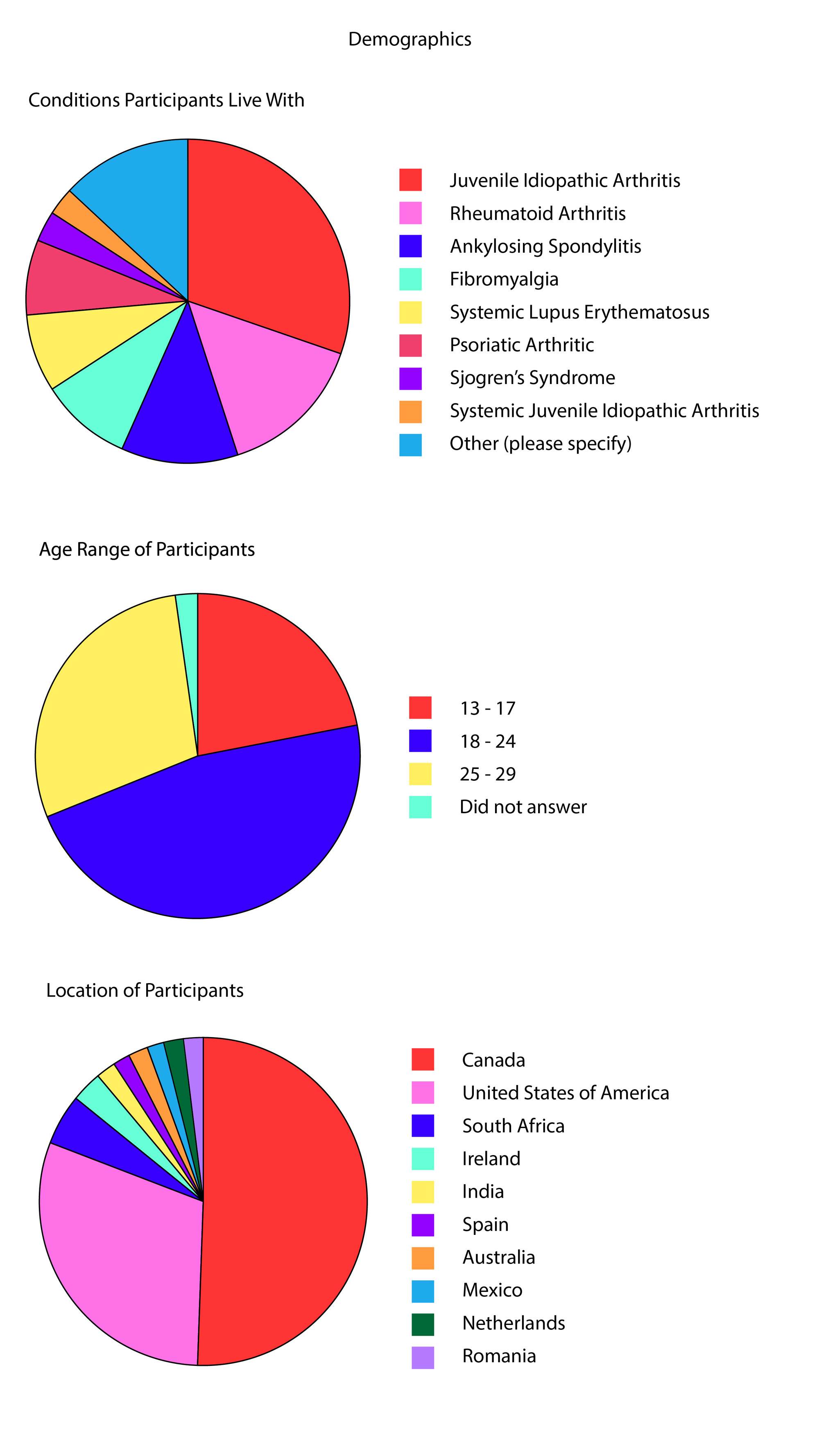Session Information
Date: Monday, November 13, 2023
Title: (1256–1263) Psychology/Social Science – Interprofessional Poster
Session Type: Poster Session B
Session Time: 9:00AM-11:00AM
Background/Purpose: Rheumatic disease doesn’t merely present physical challenges—it also significantly impacts various psychological and social aspects of one’s life, often disrupting academic progress, straining friendships, and fostering a sense of social isolation for youth and young adults. Take a Pain Check Foundation (TAPC) and the Canadian Arthritis Patient Alliance (CAPA) are grassroots, patient-driven, and managed organizations. This effort illuminates the collaboration of these organizations, shining a light on their dedication to uplifting young lives and increasing awareness about the hurdles they face. The objective of this effort was to gain a comprehensive understanding of the needs of youth and young adults with rheumatic diseases to identify strategies in support of mental health and psychosocial well-being.
Methods: A survey was developed and young people with lived experience of rheumatic disease were consulted. The survey covered several domains including navigating the healthcare system, mental health and social support, self-confidence and self-image, and the transition from pediatric to adult care. The survey was opened in September 2022 and closed in January 2023. During this time, 67 participants completed the survey. Descriptive statistics were used to analyze the data per domain and sub-group analysis based on age, disease type, and geographic area (Figure 1).
Results: Over one in two participants (52%) lived with Juvenile Idiopathic Arthritis and others lived with Rheumatoid Arthritis (25%), Ankylosing Spondylitis (20%), Fibromyalgia (16%) and Systemic Lupus Erythematosus (13%) and Psoriatic Arthritis (13%). Findings revealed that a significant proportion (79%) of respondents expressed worry about their health, and 89% said their rheumatic disease affects their mental health. Self-perception and body image were reported as dissatisfactory for over 40% of youths. While a considerable number of participants (69%) felt supported by their families in managing their condition, 20% did not feel supported by romantic partners and friends. The majority of respondents (61%) expressed satisfaction with physicians who treated their rheumatic disease. Nearly half of the respondents (48%) felt ready for the transition from pediatric to adult care transition, while an equal proportion reported a successful transition experience (50%). Significant concerns were raised regarding medication reimbursement after graduating from school, as nearly half of the participants (49%) expressed unpreparedness (Figure 2).
Conclusion: The survey provides valuable insights into the experiences and perceptions of young individuals living with rheumatic diseases and shows the need for targeted interventions and enhanced social support. Survey findings also suggest the need for innovative and tailored interventions about healthcare navigation and drug reimbursement faced by this population. Addressing this multifaceted challenge, TAPC and CAPA are creating the necessary tools and resources to aid young people with rheumatic conditions.
To cite this abstract in AMA style:
Trehan N, Proulx L, Dukes I. Voices Unheard: Unmasking the Hidden Challenges of Youth with Rheumatic Diseases [abstract]. Arthritis Rheumatol. 2023; 75 (suppl 9). https://acrabstracts.org/abstract/voices-unheard-unmasking-the-hidden-challenges-of-youth-with-rheumatic-diseases/. Accessed .« Back to ACR Convergence 2023
ACR Meeting Abstracts - https://acrabstracts.org/abstract/voices-unheard-unmasking-the-hidden-challenges-of-youth-with-rheumatic-diseases/


